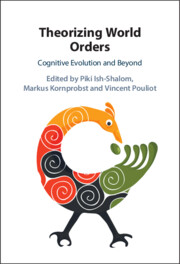Book contents
- Theorizing World Orders
- Theorizing World Orders
- Copyright page
- Dedication
- Contents
- Tables
- Preface
- Note on the Cover Image
- 1 Cognitive Evolution and World Ordering
- 2 Power in Communitarian Evolution
- 3 In Consideration of Evolving Matters
- 4 The Phenomenology of Cognitive Evolution
- 5 Narratives in Cognitive Evolution
- 6 Cognitive Evolution and the Social Construction of Complexity
- 7 Refugees and Their Allies as Agents of Progress
- 8 Holding the Middle Ground
- 9 Conclusion
- References
7 - Refugees and Their Allies as Agents of Progress
Knowledge and Power in Forbidden Boundary Regions
Published online by Cambridge University Press: 18 November 2021
- Theorizing World Orders
- Theorizing World Orders
- Copyright page
- Dedication
- Contents
- Tables
- Preface
- Note on the Cover Image
- 1 Cognitive Evolution and World Ordering
- 2 Power in Communitarian Evolution
- 3 In Consideration of Evolving Matters
- 4 The Phenomenology of Cognitive Evolution
- 5 Narratives in Cognitive Evolution
- 6 Cognitive Evolution and the Social Construction of Complexity
- 7 Refugees and Their Allies as Agents of Progress
- 8 Holding the Middle Ground
- 9 Conclusion
- References
Summary
Focusing on the historical and contemporary dilemmas posed by the “refugee crisis,” this essay investigates the potential for international progress in acknowledging our common humanity. I examine the utility of Emanuel Adler’s theory of cognitive evolution as a lens through which to assess the extent of that potential. I employ the theory to explore how certain practices dealing with forced migration became prevalent, while others lay dormant. I also examine how competing communities of practice battle to shape our understanding of forced migration in the current “post-truth” environment. I argue that cognitive evolution offers a potent conceptual framework for understanding both the extent to which the suffering of migrants has and has not been alleviated – a powerful indicator of the degree to which the world community has acknowledge their humanity. This holds for the social order of refugee protection, even in the current period as tribalism threatens to erode epistemological security, as normlessness threatens to replace a competition among norms, and as these threats weaken our shared reality.
- Type
- Chapter
- Information
- Theorizing World OrdersCognitive Evolution and Beyond, pp. 169 - 207Publisher: Cambridge University PressPrint publication year: 2021



